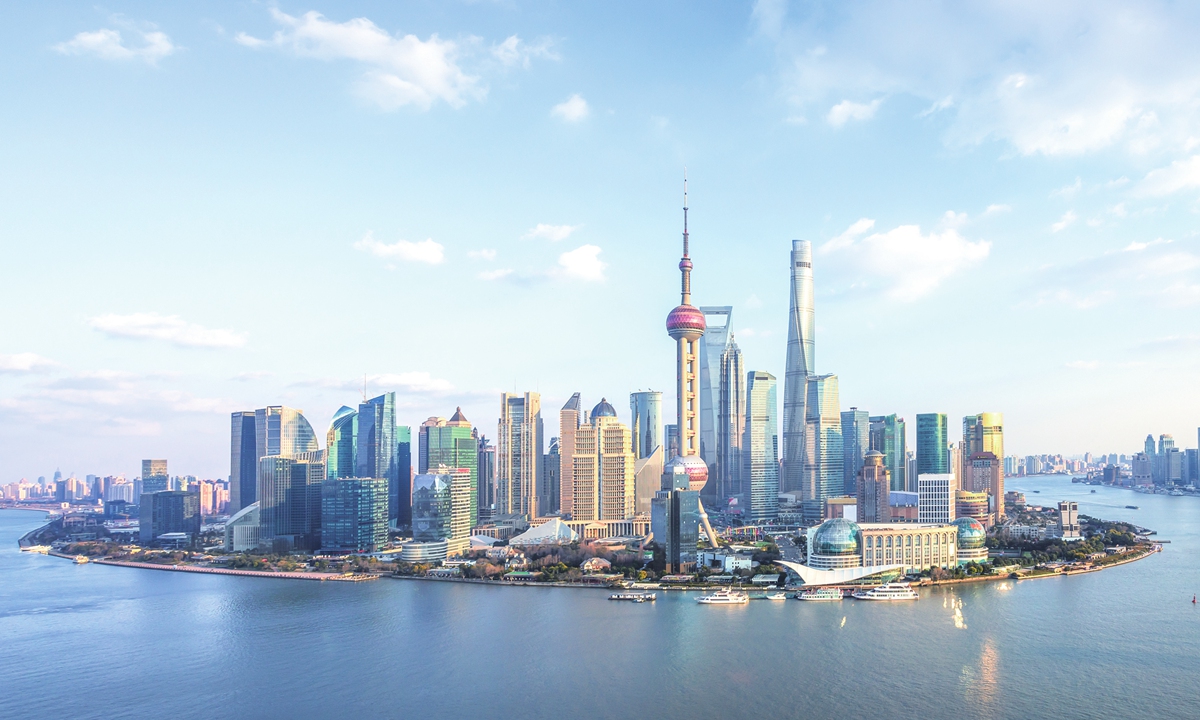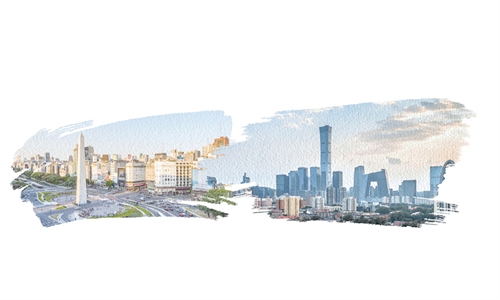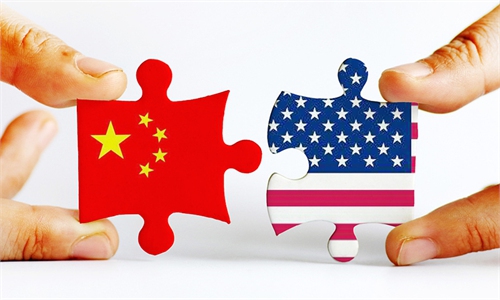
A scene of Shanghai Photo: VCG
Editor's Note:In 2023, the world continues to witness significant changes and turbulence. As we approach 2024, we conducted in-depth interviews with leading strategists from various countries and regions to gather their perspectives on the prominent global issues of 2023 and China's role in addressing them.
In the second piece of the series, former senior US diplomat Chas Freeman (Freeman) shared his thoughts with Global Times (GT) reporter Wang Zixuan, on topics including the prediction of China-US relations before the 2024 presidential election, as well as the potential black swan or gray rhino event may happen in 2024.
GT: As an experienced diplomat, you have witnessed the whole process of the normalization of China-US relations and accompanied Henry Kissinger, then assistant to the president for national security affairs, on his visit to China in 1971. What do you think is the most important legacy Kissinger left to China-US relations and the world? What can we learn from it?
Freeman: I think the major legacy of Kissinger was a strategic relationship between China and the US, which has obviously now largely disappeared, but the legacy is very valuable to both countries.
I have to say that Kissinger gets a lot of credit for things he didn't do. The idea of opening to China came from former US president Richard Nixon, and it did prove to be very difficult. It was not until the domestic political difficulties on both sides straightened out that then US president Jimmy Carter and Kissinger, the successor of Zbigniew Brzezinski, were able to achieve the normalization of China-US relations.
But I don't think that detracts from Kissinger's achievement. He knew almost nothing about China in the beginning, but then he became fascinated with China. His initial meeting in Beijing with then Chinese Premier Zhou Enlai in 1971 impressed him enormously. He was a strategic and geopolitical thinker, and so was Zhou, so there was a meeting of the minds. Unfortunately, this has gone, and I don't see much prospect of it returning in the short term.
GT: With the representative older generation figures having passed away, some have said the new generation of China policy experts in the US lacks understanding and respect for China. What's your view? What are the implications for US' China policy?
Freeman: I'm not sure how much understanding of China our politicians ever had. I think there were always a lot of misunderstandings. If you look at China-US relations historically, they change almost every 10 years. Going back to World War II, China and the US were allies. In the 1950s, we were enemies in the Korean War. In the 1960s, the US gradually adjusted its relations with China. In the 1970s, we became partners in blocking soviet expansion. In the 1980s, China became the principal partner of the US economically. All of the warmth went out of the relationship in the 1990s. As the relationship matured in the first decade of the 21st century, we had a series of incidents, which were very unpleasant. These were followed by the trade war and technology war started by Donald Trump.
I think China-US relations resemble Sino-Soviet relations in some respects. Russia and China had a falling out around 1960s, it took almost 30 years for the two to find each other again, realizing that they had reasons to cooperate. So I think China-US relations are likely to take some time to be restored, because the common interests of the two countries are great.
GT: In San Francisco, Chinese President Xi Jinping noted that "for China and the US, turning their back on each other is not an option, it is unrealistic for one side to remodel the other." He also stressed that "the hope of the China-US relationship lies in the people, the vitality comes from exchanges at subnational levels." What do you think of the way of getting along with the US proposed by China? How will it shape the future of China-US relations?
Freeman: I thought Xi's statements and performance in San Francisco were exemplary. That is good diplomacy. I think there's a long tradition in China of seeking common ground while reserving differences, and this is a sound approach to managing difficult relations. I think he's absolutely correct that the basic support for the relationship is people-to-people relations. I think he was successful in reassuring many Americans who are favorable to China in the business community. China also values their friendship and wishes to continue to cooperate with them. I think he also wanted to reassure Chinese domestic private sector that he could manage the relationship with the US, and I think he succeeded in that.
GT: Why does the US continue its containment policy against China even after the friendly meeting? How should we maintain stability after the latest meeting?
Freeman: I think it's fair to say that both sides approached this meeting with the objective of improving the tone and the atmosphere of the relationship, but neither side was prepared to make concessions on issues of concern to the other side.
The substantive results were very limited. The fact that we can communicate is very important. But as I indicated, I don't see any immediate prospect of an improvement, and I don't think American politics on the China question or Chinese politics on the American question have changed. We have to deal with the fact that we have serious arguments. Some of them, I think, are actually quite ridiculous. It would be better if we had something positive to say to each other which apparently we don't at the moment.
GT: The Xi-Biden meeting in San Francisco brings temporary stability to bilateral relations. How do you see China-US relations in 2024, especially before the election?
Freeman: I don't expect any real change. On the American side, it is almost impossible to predict what will happen politically. Biden is sinking in the polls. There's widespread dissatisfaction with his conduct of our affairs, both domestic and foreign. After all, he is dealing with basically failed foreign policy in Ukraine and the Middle East, and the Taiwan question is not being successfully managed with China either.
I think the US policy toward China is essentially paralyzed. It cannot change, and we will see who is elected in 2024, and whether that person has the ability to reshape public opinion as Nixon did. In 1972, Nixon took a very hostile relationship in view of China and transformed it with a dramatic act. It is not impossible for the same thing to happen again. But I don't think there's anybody who can tell you with any assurance what is going to happen between now and November in 2024.
GT: Many observers said that the US' Middle East policy is backfiring, why didn't the US foreign policy work well in the Middle East? How do you see China's role in resolving such regional turmoil?
Freeman: The US policy in the Middle East is essentially a projection of domestic politics. It reflects the hammerlock on our politics of the Israel lobby, which means that Israel is the centerpiece of the policy. The US is now supporting Israel and what can only be described as genocide in Gaza and the West Bank.
As a result, the US is losing a great deal of prestige and has a very damaged reputation in much of the world, even in the West. Grave questions are now being raised about the wisdom of US policy in the Middle East. I think a wise policy is, in fact, to reach out to China on the Ukraine conflict, where China has put forward principles for peace that are impossible to disagree with.
As for the Middle East, where China does not have the burden of history that the US does, I think we should be working together to solve these two wars and to end them. China has been very careful to avoid becoming entangled in the quarrels of countries in the Middle East. I think that's been a wise policy. We should be looking to China for help.
GT: It could be said that the Israel-Palestine conflict is a black swan event of 2023. What black swan or gray rhino event might happen in 2024?
Freeman: I don't agree that what happened in the Middle East is a black swan, it was entirely predictable. The only surprise was the military competence of Hamas.
There's a possibility that the war between Israel and Palestine will spread. There are some indications of this already. There are many in the Arab world who would volunteer to fight the Israelis and Iran may be dragged into this, so that is a very dangerous situation.
But I think it's entirely possible that there will be a peace between Kiev and Moscow, maybe with European support, but excluding the US. And I think that would be a geopolitical event of great magnitude. I think we have not fully seen the effects of the divorce between Russia and Europe in terms of the European economy and European politics. I should say we were watching the deterioration of the German economy, and we're watching Europeans react badly to the trade surplus with China.
I don't know what will happen in the Taiwan elections in January, at the moment, it seems more likely that this could produce a crisis, whether it would lead to confrontation between the US and China is not clear.
Finally, one other possibility that occurs to me is that the United Nations, which has been sidelined, may resume a central role in global affairs. You see this with the efforts of the Secretary-General António Guterres to energize the Security Council on the Middle East problem and his efforts on the Ukraine war.



